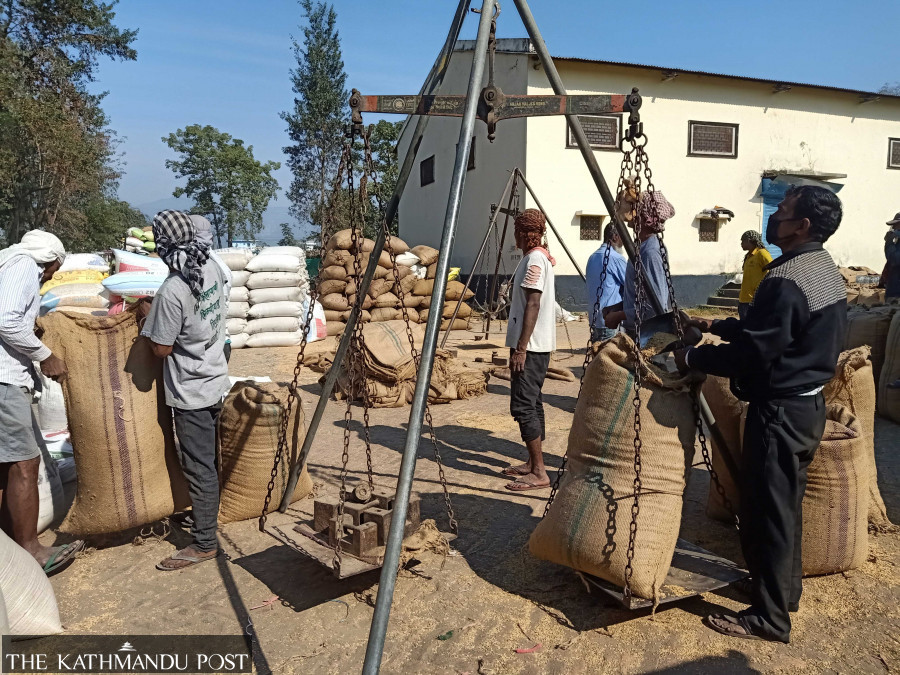Money
Farmers upset by government delays in buying their paddy
They say the holdup is messing up their crop plans, and they need the money to buy fertiliser and seeds for their winter crops.
Ganesh Chaudhary
Farmers in western Nepal are anxious to sell their paddy and get ready for the winter crops, but the state-owned company assigned to procure their harvests said they were still waiting for instructions from higher authorities.
"We have not received any circular for paddy procurement," said Angela Basnet, chief of Food Management and Trading Company in Dhangadhi. “We will start purchasing paddy from farmers as soon as we get the instructions.”
The paddy growers have been complaining that the government is delaying buying paddy from them even though it has fixed the minimum support price for their harvest.
They are upset by the government's delay in purchasing their paddy because the holdup is messing up their crop plans, and they need the money to buy fertiliser and seeds for their winter crops.
Many farmers have not started planting their winter crops. Wheat, pulses, maize and mustard are normally grown in the winter in the southern Tarai districts.
“Why fix the minimum support price when the government does not buy the crops from farmers?” said farmer Kamal Budha of Janaki Rural Municipality-3 Subarnapur in the eastern part of Kailali. “Farmers are worried because they have no money as they have not been able to sell their paddy, " he said. "Money lenders try to buy good quality paddy as cheaply as possible."
He added that they try to take advantage of the government's delay by buying good quality paddy at low prices from farmers.
Another farmer Bhoj Raj Chaudhary said that the minimum price set by the government should apply to paddy traders too, and not only Food Management and Trading Company. "Traders should be required to pay the minimum prices too, not only the government company," he added.
"The government decision should be followed by both Food Management and Trading Company and the traders," Chaudhary said.
"The state-owned enterprise also makes a profit by purchasing paddy from farmers. It would be easier for everyone by determining the price of paddy according to the investment made and adding a profit margin according to the purchase," he said.
Chaudhary said that as the government has been delaying buying paddy from farmers after fixing the minimum price, they are being forced to sell their production at cheap rates to lenders. "Even if good paddy should be purchased at the price fixed by Food Management and Trading Company, traders pay Rs500 less per quintal. We are having a hard time.”
Traders are not willing to purchase paddy this year because they say the crop has been damaged by the recent unseasonal rainfall. The traders have set paddy prices on their own.
Jit Bahadur Chaudhary, a farmer from Tikapur Municipality-1, said they were compelled to sell their paddy harvest at whatever prices the traders offer. “It would be the biggest relief to us if the government bought the paddy that was damaged by the floods,” he said.
This year, the minimum support price of “common paddy” has been raised to Rs29.02 per kg from Rs28.85 per kg last year. In the previous year, the price of common paddy was Rs26.73 per kg.
The minimum support price for "mota dhan" (short grain) has been set at Rs27.52 per kg, up from Rs27.35 per kg last year. In the previous year, the price was Rs25.32 per kg.
This year the floor price was issued on September 14, just one month before farmers began collecting their harvests.
The government was late in announcing the minimum support price for paddy this year. Usually, the rate is declared well in advance for farmers to plan their crops before the start of the planting season.
The minimum support price is the price the government guarantees to pay farmers for their harvest if the bottom drops out of the market.
Last year too, most farmers could not sell their paddy at the price fixed by the government. Farmers say that Food Management and Trading Company stopped buying their paddy saying that the procurement quota had expired.
Naresh Chaudhary, a farmer of Janaki Rural Municipality-6, said he waited to sell his paddy to Food Management and Trading Company last year. Later the company said the quota had been used up, and he had to sell it at a cheap price to money lenders.
“This year, the purchase has not started yet. We are hard up for cash and our paddy is not being sold,” he said. “I am worried about how to pay for my daily expenses.”
Food Management and Trading Company chief Basnet said the company had bought 5,300 tonnes of paddy from farmers last year out of the target to buy 6,500 tonnes.
The unseasonal rains and floods in October had caused losses amounting to Rs11.87 billion in the farm sector. The Agriculture Ministry said that an estimated 424,113 tonnes of paddy on 111,609 hectares had been destroyed.
The statistics show that paddy crops on 90,996 hectares were completely damaged. Similarly, paddy crops on 62,155 hectares were partially damaged and paddy on 39,383 hectares were slightly damaged.
In Kailali and Kanchanpur districts of Sudurpashchim province, the rains damaged 138,528 tonnes of paddy on 36,455 hectares. The total losses in the province have been assessed at Rs3.87 billion.




 15.12°C Kathmandu
15.12°C Kathmandu.jpg)














